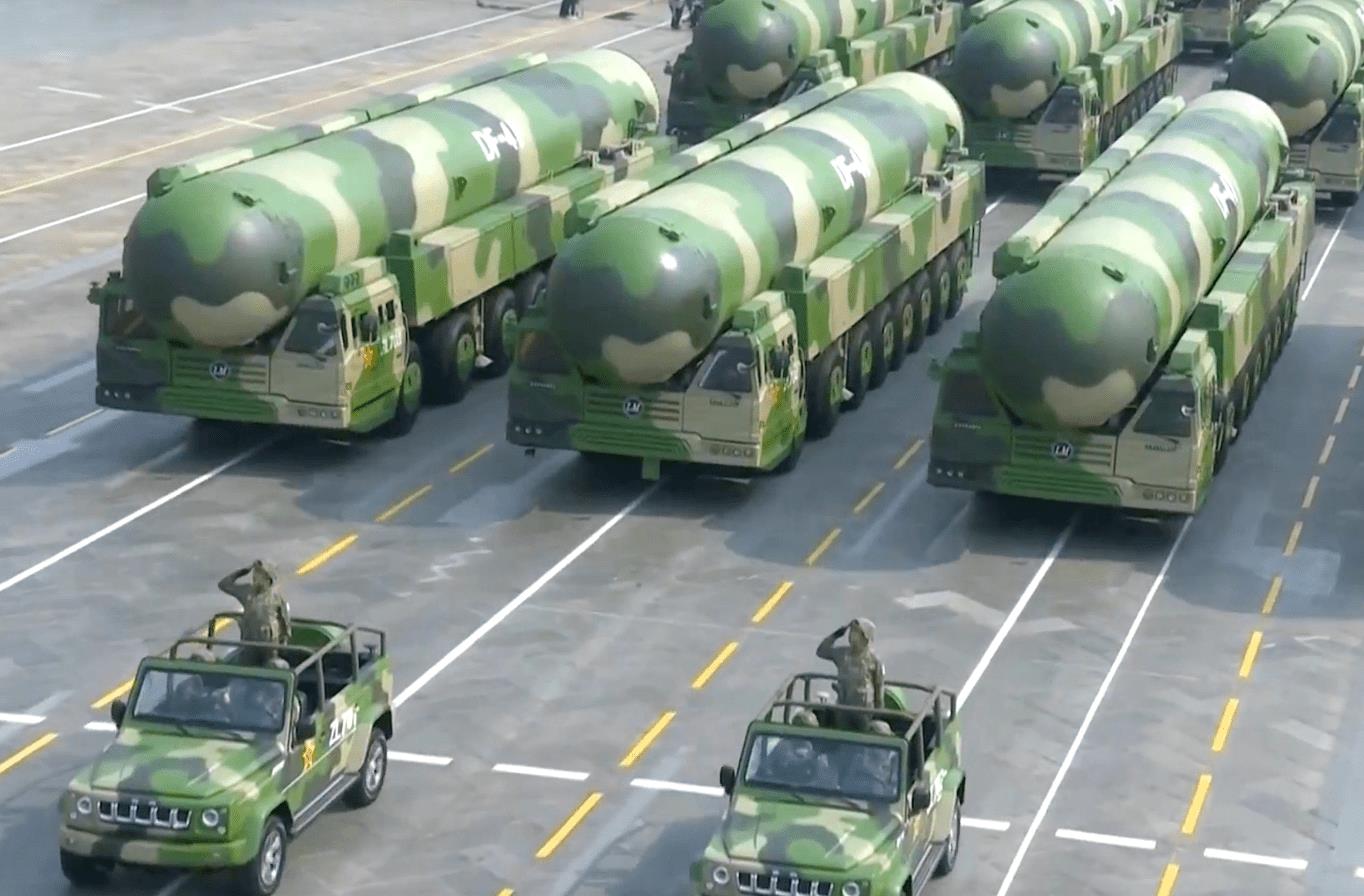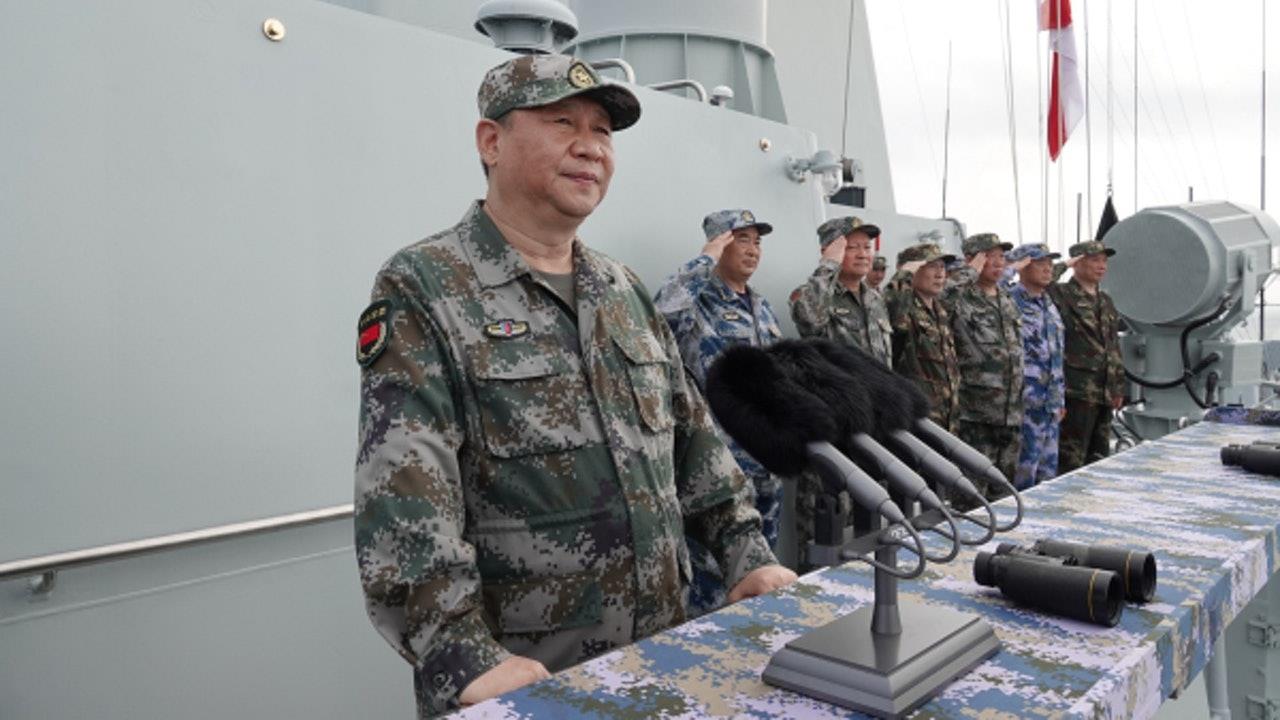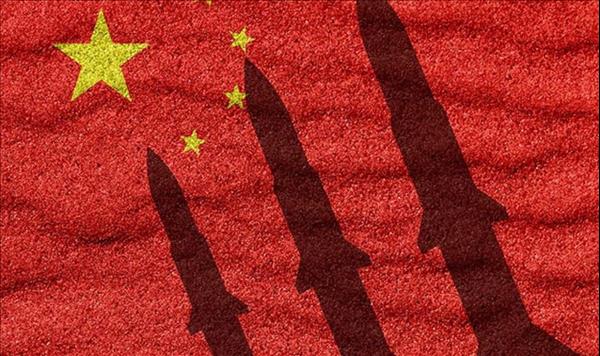
China Upgrades Nuke Test Site With An Eye On Taiwan
Satellite photos obtained by Nikkei last week show that China is rapidly expanding its nuclear test facilities in western Xinjiang, sparking fears of a renewed nuclear arms race with the US as tensions boil over Taiwan.
The Nikkei report states that a satellite hovering at 450 kilometers detected extensive construction at the Lop Nur test site, a dried salt lakebed in the arid and restive Xinjiang region that borders Kazakhstan, Kyrgyzstan, Tajikistan, Afghanistan, and Pakistan.
The report said that China may be building a sixth tunnel for underground testing, evidenced by broken rocks piled nearby and extensive coverings erected on a nearby mountainside. The satellite photos also show power cables, possible storage facilities for high explosives and unpaved roads from command centers.
An unnamed expert from US private geospatial analysis company AllSource Analysis told Nikkei that these developments enable China to conduct nuclear-related tests anytime. The power lines and road system now connect Lop Nur's western military nuclear test facilities to new possible test areas in the east.
Nikkei suggested that evidence of a sixth test tunnel points to China's planned resumption of nuclear tests, the last of which was conducted in 1996.
Nobumasa Akiyama, a professor of East Asian security at Hitotsubashi University, told Nikkei that China's accelerated development of the Lop Nur test site means it intends to deter US intervention in an invasion of Taiwan by threatening the use of small nuclear weapons.
Nikkei also notes that maritime control will be the primary military issue in any invasion of Taiwan. Small nuclear weapons with limited strike capabilities would be sufficient for China to ward off US aircraft carriers. This strategy mirrors that of Russia in Ukraine, with its threat of nuclear escalation used as strategic cover to pursue conventional military operations.

While still trailing the US in nuclear weapons strength, experts say China is increasing its capability across the board. Credit: Handout.
The development may be part of China's more extensive efforts to modernize its nuclear arsenal for a Taiwan scenario. Asia Times has previously reported on other stories regarding China's nuclear arsenal, including its building of land-based nuclear silos, rail-based nukes, ballistic missile submarines and nuclear-armed stealth bombers at a rapid-fire pace.
Taiwanese and US officials have opined that China may invade Taiwan sooner than anticipated, suggesting dates as soon as 2025, 2027 and 2030.
“By 2025, China will bring the cost and attrition to its lowest. It has the capacity now, but it will not start a war easily, having to take many other things into consideration,” said Taiwan's Defense Minister Chiu Kuo-cheng in a 2021 article in The Guardian.
General Mark Milley, US chairman of the Joint Chiefs of Staff, noted in a 2021 US Naval Institute (USNI) article that China wants to acquire the military capabilities to invade and hold Taiwan by 2027. His assessment was based in part by Chinese President Xi Jinping's speech calling for an acceleration of China's military modernization and capabilities to seize Taiwan.
Moreover, US Director of National Intelligence Avril Haines mentioned in a 2022 CNN article that Taiwan faces an acute China threat between the present and 2030, noting that China is working hard to put itself in a military position to take Taiwan over a US military intervention. However, Haines declined to comment on China's planned timeline for its move against Taiwan.
Internal factors such as flaws in China's political system, slowing economic growth, and a shirking population may give China an added sense of urgency to strike a decisive blow against Taiwan within an accelerated timeframe.
In a 2022 Taipei Times article , Jerome Keating notes that one-party authoritarian states such as China and Russia are vulnerable to power struggles as their leaders often lack graceful exit strategies as institutionalized in democratic states.
Moreover, he notes that as strongmen leaders get to the top, they make numerous enemies in the process, which gives them a sense of urgency to stay in power for their safety.
Keating mentions Xi had made many enemies during his rise to power and that there had at least been seven attempts on his life. However, he also notes that with no clear successor in sight, settling the Taiwan issue before 2027 would cement his legitimacy and extend his hold on power.
In that connection, China's slowing economy may give it further incentive to act on Taiwan sooner rather than later. In a 2022 Axios article , Matt Philips notes that economic analysts doubt that China will regain its breakneck economic development as seen in the 1990s and 2000s, which lifted millions of Chinese out of poverty.

Chinese President Xi Jinping inspects a joint military exercise in the South China Sea in April 2018. Photo: Xinhua
With limited options to restart economic growth, Philips notes that Xi may have shifted his source of legitimacy from boosting economic growth to a broader sense of national prestige by retaking Taiwan and projecting China's power on the world stage.
However, he also cautions that China's escalation in the Taiwan Strait is not to provide a distraction from its present economic woes, as since 1949 China has always been very sensitive about Taiwan's international status.
China's slowing population growth may also weaken its military in the long run, adding another reason for resolving the Taiwan issue before the debilitating effects of demographic decline hit its military. A 2021 Taiwan News article reports that 18% of China's population is over 60 years old, and there were only 8.5 live births per 1000 in 2020, a massive drop from 18 per 1000 in 1978.
In addition, high living costs and a hyper-competitive education system have forced many Chinese to put off having children, resulting in a significant population decline.
The same source notes that a shrinking manpower pool and Chinese youth's preference to enter technology rather than military fields has motivated projects to bring aging veterans back to active duty.
In the last analysis, China's push to accelerate its nuclear weapons program to deter a US intervention in a Taiwan scenario may be driven equally by military and internal factors.

Legal Disclaimer:
MENAFN provides the
information “as is” without warranty of any kind. We do not accept
any responsibility or liability for the accuracy, content, images,
videos, licenses, completeness, legality, or reliability of the information
contained in this article. If you have any complaints or copyright
issues related to this article, kindly contact the provider above.


















Comments
No comment